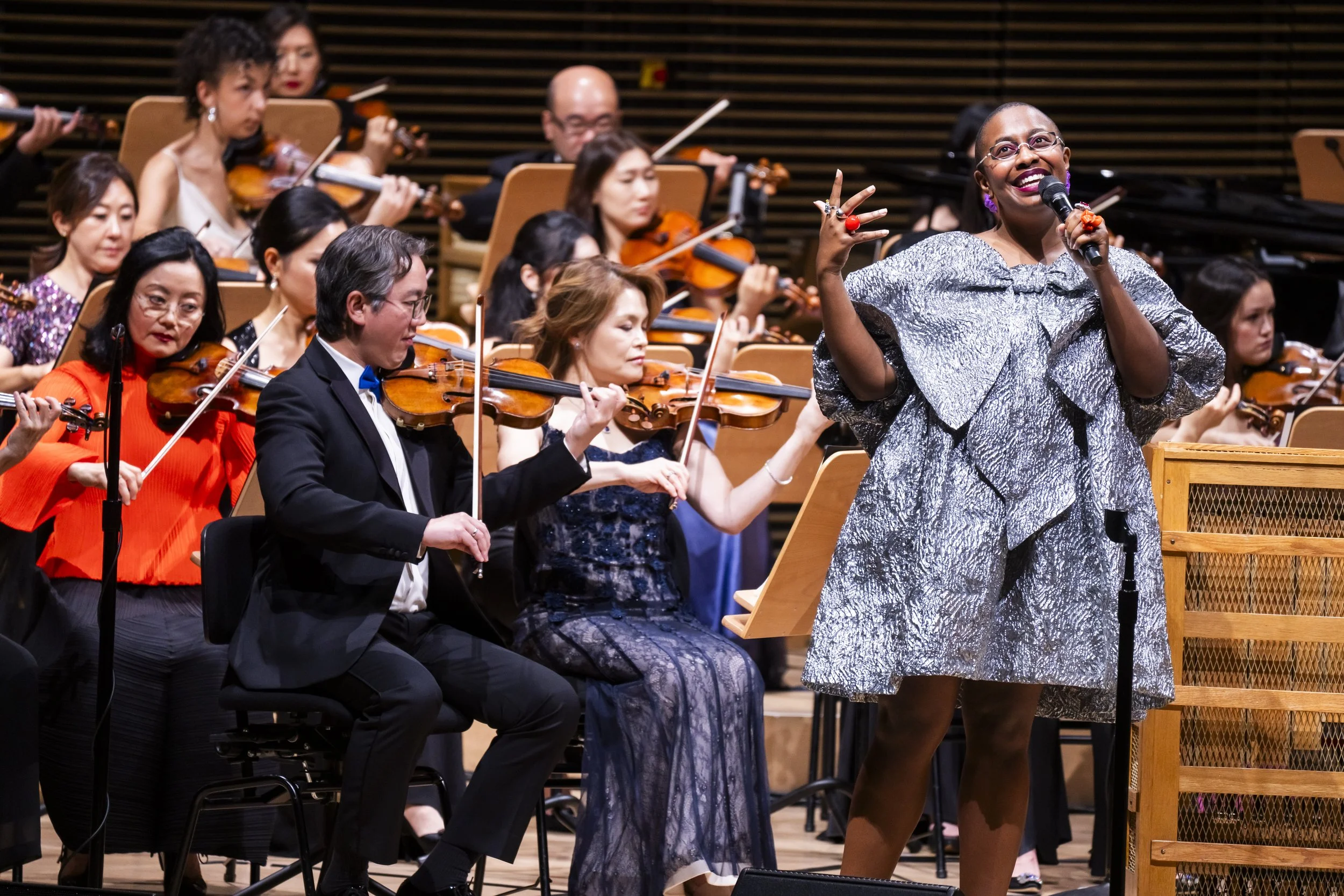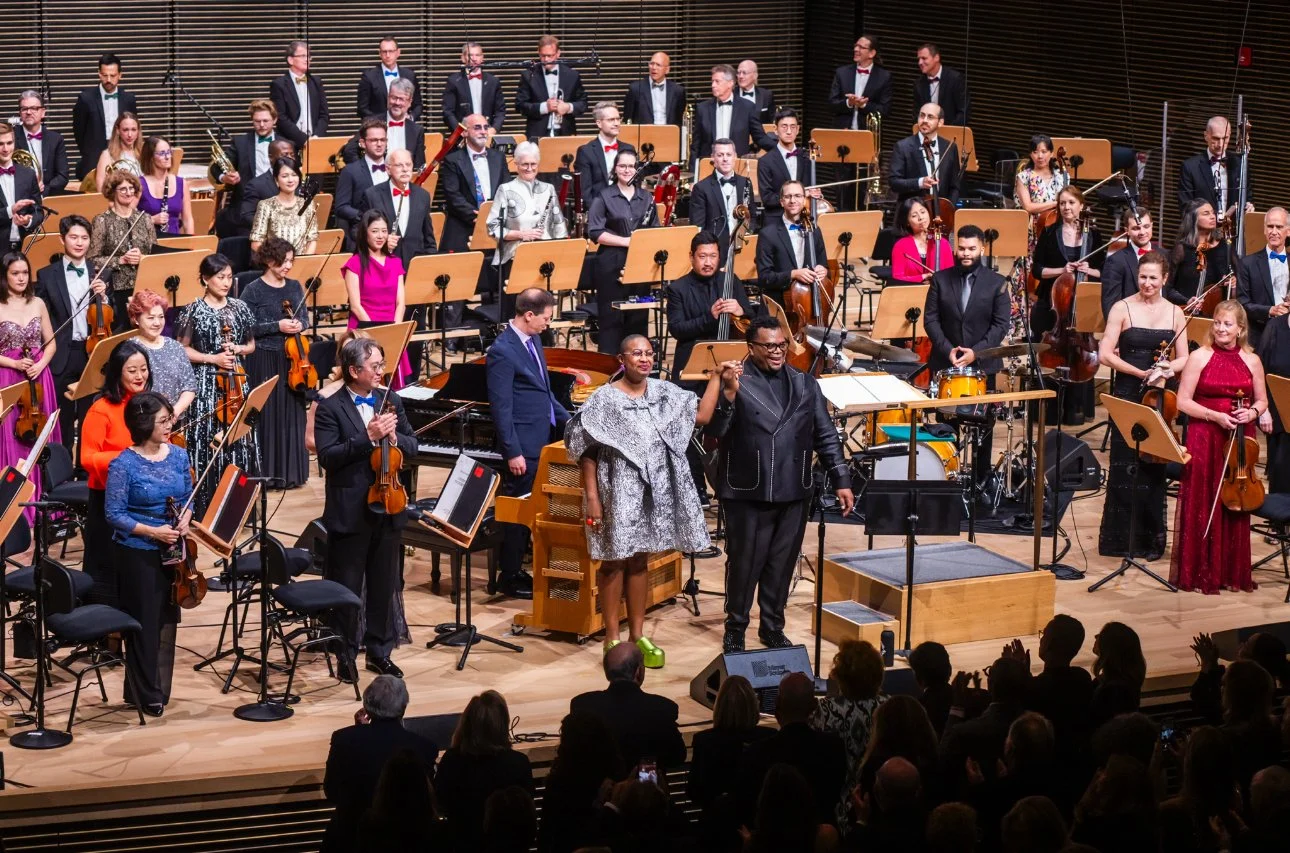NY Philharmonic: 2025/2026 Season Opening Gala
September 25, 2025 saw the New York Philharmonic return to David Geffen Hall for their yearly Opening Gala. The event paid tribute to the work of company Director Emerita Vera Blinken, and her late husband Donald Blinken, who served as United States Ambassador to Hungary.
The evening's guest artist was Grammy Award-winning Jazz vocalist Cécile McLorin Salvant, joined by conductor Anthony Parnther for a sensational program of works ranging from opera to musical theatre.
Kicking things off with energy and panache was the overture from the Gershwins' 'Strike up the Band.' The orchestra under Parnther excelled in laying out the dense, vivacious textures with remarkable balance to let all the intricate parts shine with clarity. Continuing with the Gershwins, Salvant joined Parnther and orchestra for 'There’s a Boat That's Leaving Soon for New York' from 'Porgy & Bess.' Opting for a rendition more relaxed and congenial than Sportin' Life's approach, Salvant carried much charm through her opening number.
Her next number, 'With Every Breath I Take' from Cy Coleman's 'City of Angels,' displayed a more somber yet lyrical beauty as Salvant navigated the measures of longing backed by the luxurious texture of sweeping, jazzy motifs reminiscent of Hollywood's yesteryear. Her lower register illuminated facets of affection as well as aggrievement with breathtaking results, swelling with power when needed, yet bringing things to a hushed awe to close.
Following this was 'Barbara Song' from Weill and Brecht's 'The Threepennny Opera.' Salvant made the most of this number through her soulful parlando which translated beautifully to the rueful nature of the selection, each rejection humorously undercutting the nuanced emotions of their buildup. Taking the program to a more classical bent were the following trio of selections. Purcell's 'Dido and Aeneas' saw Salvant relate an elegiac beauty that was sorrowful as it was lovely, skillfully balancing the two to create an intoxicating softness, and emphasized all the more by the baleful textures from the brass to complete the funereal effect.
The following two numbers paid homage to Salvant's French roots, as she shared a little of her experience growing up in a French-speaking home. The first, 'Au bord de l'eau,' was a showcase of tremendous lyricism, punctuated by the occasional nasally touch to sprinkle a bit of attitude, while the 'Seguidilla' from Bizet's 'Carmen' carried with a playful allure from her ornaments as Salvant used her command of the language to make the numbers her own.
Closing out the program’s songs was 'Being Alive' from Sondheim's concept musical 'Company.' This powerful song of vulnerability and longing was given stunning treatment through Salvant's seamless control across her registers, where more conversational phrases dripped with substantial heartache, and the later belting held nothing back as she brought this number to a powerful and satisfying conclusion.
Last on the bill for the evening was Duke Ellington’s “Black, Brown, and Beige,” where the expressivity of Parnther and the orchestra was on full display as they outlined a number of symphonic effects which blended together into a dazzling texture of city life rich, with no shortage of brassy conversation and drumlines which build from a jaunty pace to an outright sprint.
After the program, Salvant returned to the stage for an encore of Bernstein's 'Glitter and Be Gay' from 'Candide.' This classic soprano showcase excelled due to Salvant's balance of comedy and anguish, finely conveying the unhinged nature of Cunegonde's mental state. While Salvant opted for actual laughter for the later ornamentation, she made the piece highly unique to herself and stuck the final high notes with fervor and precision, earning the applause which followed, and ending things in a way which would be hard to top.
In all, this was a highly exciting concert thanks not only to the range of the program, but the artistic expertise and adaptability of Salvant, Parnther, and orchestra. The support of their patrons made it possible for the NY Phil to raise $3.3 million that evening, making for an evening that the company and audience alike won’t be soon to forget.
-written by Logan Martell




